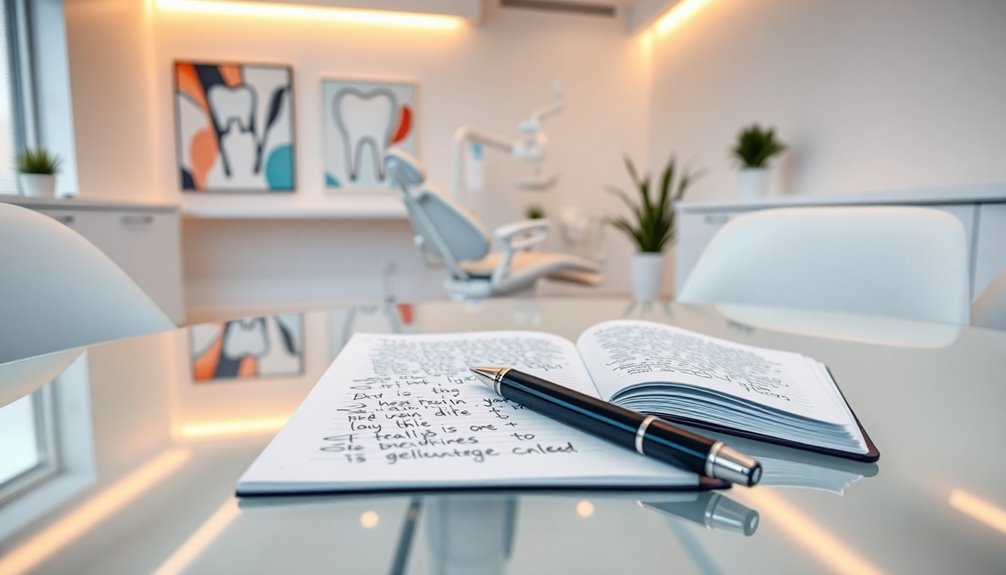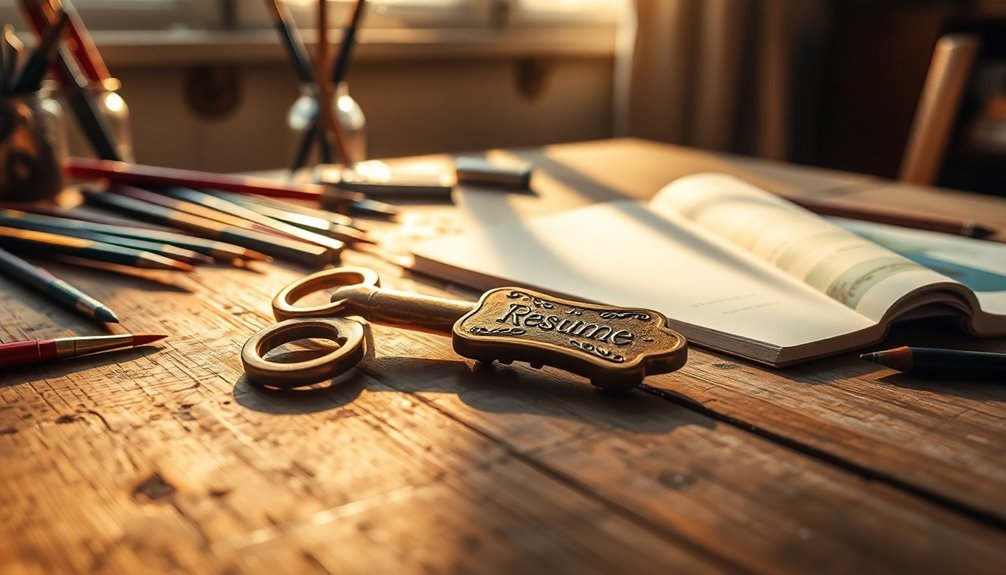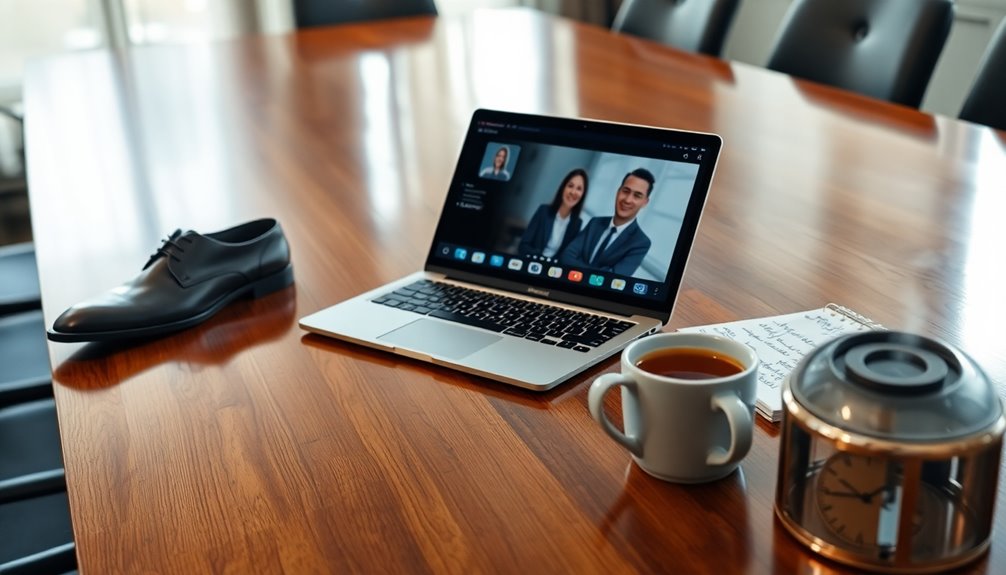When heading to a job interview, you can't forget some essential items. First, bring an organized document folder for neat access to your materials. Don't forget multiple copies of your resume and professional business cards to share. A strong reference list enhances your credibility, so prepare that, too. A notepad shows you're engaged and ready to take notes. Thoughtful questions reflect your interest and keep the conversation flowing. Ultimately, maintain a positive attitude to boost your confidence. With these essentials in hand, you're setting yourself up for a successful interview experience that leads to great opportunities. Want to know more?
Key Takeaways
- Bring an organized document folder to keep essential materials neat and easily accessible during the interview.
- Have multiple copies of your resume (at least five) to ensure all interviewers can reference your qualifications.
- Include a professional business card to reinforce your personal brand and facilitate easy contact sharing.
- Prepare a list of strong references with contact information to enhance your credibility during discussions.
- Carry a notepad for taking notes, demonstrating engagement and interest in the conversation.
Importance of Preparation

Many candidates underestimate the importance of preparation for a job interview. Arriving well-prepared can greatly enhance your chances of making a strong first impression, reflecting professionalism and attention to detail. When you take the time to prepare, you'll not only alleviate anxiety but also focus on showcasing your qualifications and fit for the role.
Conducting thorough company research is essential. It shows genuine interest and equips you to answer questions more effectively, demonstrating that you're invested in the opportunity. Additionally, having essential materials ready, like multiple copies of your resume and a list of references, showcases your organizational skills and readiness for the conversation ahead.
Essential Items to Bring
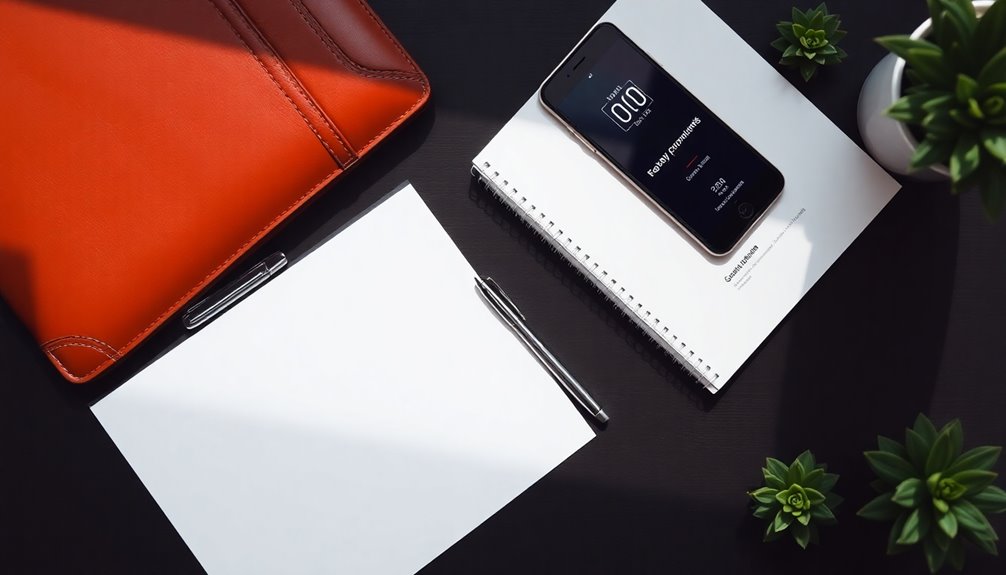
When you're heading to an interview, having an organized document folder can make a big difference in how you present yourself. It keeps your materials neat and easy to access, allowing you to focus on the conversation rather than fumbling through papers. Plus, don't forget to bring professional business cards; they're a great way to leave a lasting impression.
Organized Document Folder
Bringing an organized document folder to your job interview is essential for showcasing your professionalism and preparation. This folder keeps your important materials neat and easily accessible, demonstrating strong organizational skills to your interviewers. You don't want to scramble through scattered papers, risking the loss of critical items like your resume, reference lists, or certificates. Having everything at hand guarantees you're ready to impress.
Using a well-organized folder reflects your attention to detail, which contributes positively to first impressions. When interviewers see you've taken the time to prepare, it signals you're serious about the opportunity. Plus, a well-structured folder can hold notes you take during the interview, showing engagement and active listening to the conversation.
Don't forget to include multiple copies of your resume; this allows for easy distribution if you're in a panel interview. Being able to hand out your resume without hesitation reinforces your preparedness and confidence. To summarize, an organized document folder isn't just a practical accessory – it's a powerful tool that enhances your professionalism and sets the tone for a successful interview.
Professional Business Cards
An organized document folder is just the start of your interview preparedness; having professional business cards is equally important. These cards offer a convenient way to share your contact information, reinforcing your personal brand and enhancing your professionalism. When you meet potential employers, business cards guarantee they can easily reach you after the interview.
Consider including the following on your business card:
- Your name
- Phone number
- Email address
- LinkedIn profile
Additionally, having your contact information readily available can help in maintaining accountability partners who may provide support throughout your job search process.
Folder for Organization
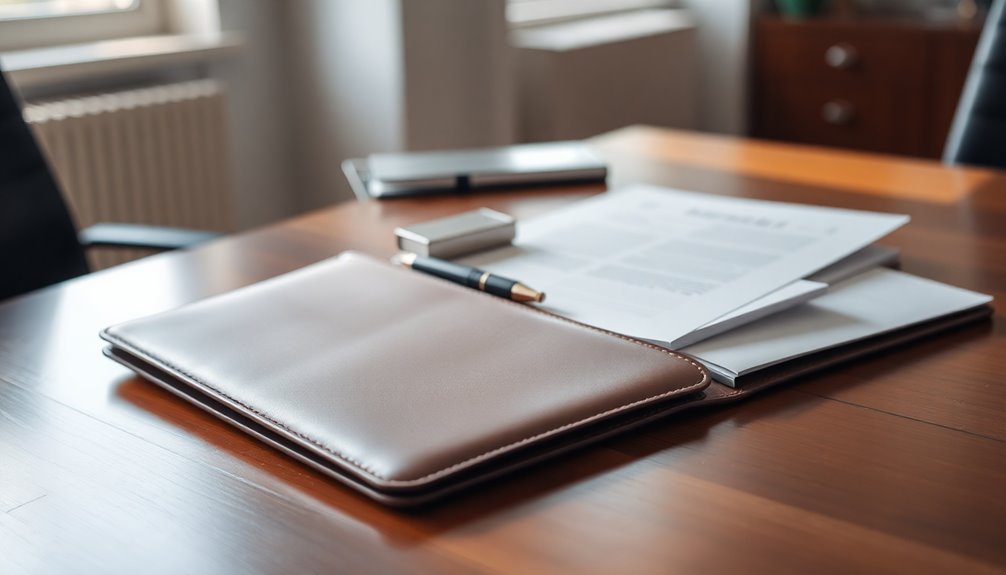
A folder is a must-have for your job interview, as it keeps your documents neat and organized. It not only enhances your professional appearance but also allows for easy access to important papers. Showing up with a well-prepared folder signals your seriousness and readiness for the opportunity.
Keeps Documents Neat
Using a folder to keep your documents organized not only simplifies access during the interview but also reflects your professionalism. When you bring an organized folder, you're demonstrating attention to detail and making a strong first impression. You won't have to scramble for essential items, ensuring a smooth and confident interview experience.
Here are some key benefits of using a folder:
- Document Protection: Keeps your resumes and supporting documents safe from bending or wrinkling.
- Multiple Copies: Holds several copies of your resume and a reference list, so you're prepared for any scenario.
- Note-Taking: Serves as a handy place for taking notes during the interview, showcasing your active engagement in the conversation.
- Easy Access: Simplifies access to all your documents, eliminating last-minute panic.
Having an organized folder not only enhances your preparation but also shows that you value the opportunity. It reinforces your professionalism and sets the tone for a productive discussion. Additionally, maintaining a clean and safe environment for your interview preparation can help you focus better and reduce stress. So, make sure that your folder is neat, well-arranged, and ready to impress!
Enhances Professional Appearance
Bringing a professional-looking folder to your interview instantly elevates your appearance and showcases your commitment to the opportunity. A well-chosen folder not only keeps your documents organized but also reflects your attention to detail. When you arrive with a neat folder, it signals to the interviewer that you value professionalism and are prepared.
By storing essential paperwork like your resume and reference lists in a folder, you help prevent any loss or damage to these important documents. This organization guarantees that everything is presented in a polished manner, reinforcing your professional image. Plus, having your documents easily accessible allows for quick retrieval during discussions, facilitating smooth conversations and demonstrating your preparedness.
Additionally, a folder can house notes taken during the interview, illustrating your engagement and active listening skills. This proactive approach positively influences the interviewer's perception, emphasizing that you're genuinely interested in the position.
Facilitates Easy Access
Having an organized folder makes it easy to access all your essential documents during the interview. When you bring a well-prepared folder, you demonstrate professionalism and attention to detail—qualities that can leave a lasting first impression. It serves as a centralized location for all the vital documents to bring to the interview.
Here are some key items to include in your folder:
- Resume: Keep multiple copies on hand for yourself and any interviewers.
- Reference List: Prepare a list of contacts who can vouch for your qualifications.
- Portfolio: If applicable, include samples of your work that highlight your skills.
- Notes: Jot down key points during the interview for future reference and follow-up.
With an organized folder, you can easily access materials and respond to questions without delay. This not only streamlines the interview process but also showcases your readiness and capability. By keeping everything neat and undamaged, you guarantee that you present yourself in the best light possible, reinforcing your professionalism and commitment to the opportunity.
Multiple Resume Copies
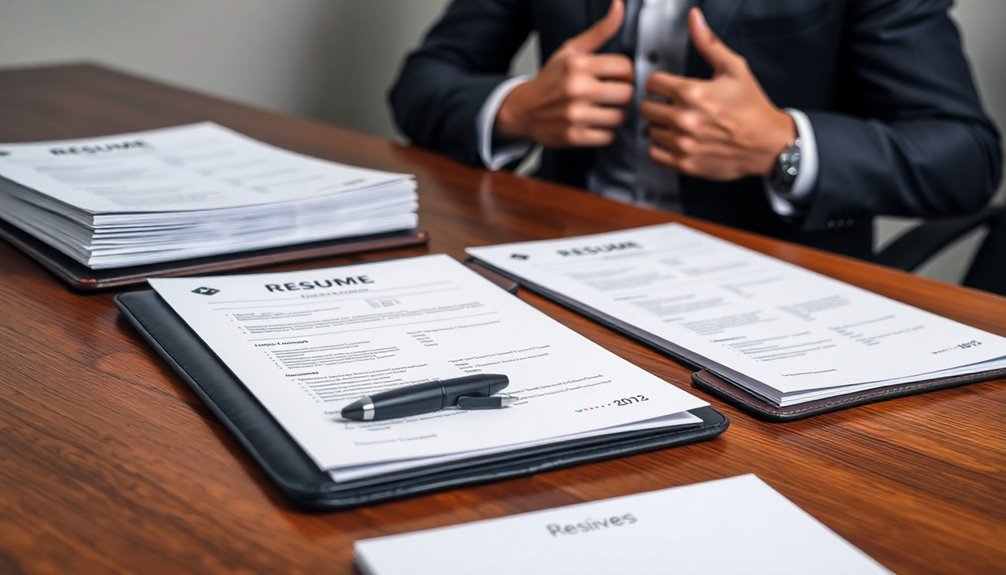
Preparing for an interview means being ready for anything, and that includes having multiple copies of your resume on hand. You should always aim to bring at least five copies. This guarantees each interviewer has access to your qualifications, especially in panel interviews where multiple people are evaluating you at once.
Having those printed resumes allows you to reference specific experiences or skills easily while answering questions, reinforcing your qualifications in real-time. It also shows your professionalism and preparedness, which can considerably influence the interviewer's perception of you as a candidate.
Organization matters too. Keep your resumes neatly arranged in a folder to prevent any damage and to convey attention to detail. This simple act enhances your overall presentation and underscores your commitment to being prepared. Additionally, being well-prepared can help you manage irregular income during the job transition period, ensuring financial stability as you seek employment.
Business Cards for Networking

Networking is an essential part of the job search process, and business cards can be a powerful tool in making connections. When you're in an interview or networking event, having a well-designed business card ready to hand out reinforces your personal brand and creates a professional image. Including your contact information makes it easy for interviewers and potential employers to reach out, which can be vital for follow-up opportunities.
Here are some key elements to include on your business card:
- Your name
- Phone number
- Email address
- LinkedIn profile link
Carrying business cards demonstrates your preparedness and professionalism, leaving a lasting impression on those you meet. They serve as effective follow-up tools, reminding contacts of your qualifications and interest in the role. A thoughtfully designed card not only sets you apart from other candidates but also reflects your attention to detail. Ultimately, business cards are a small investment that can lead to significant networking opportunities and potential job offers. So, don't forget to pack them before your next interview or networking event! Additionally, utilizing data-driven marketing strategies can enhance your networking efforts by targeting the right connections and opportunities.
Portfolio or Work Samples
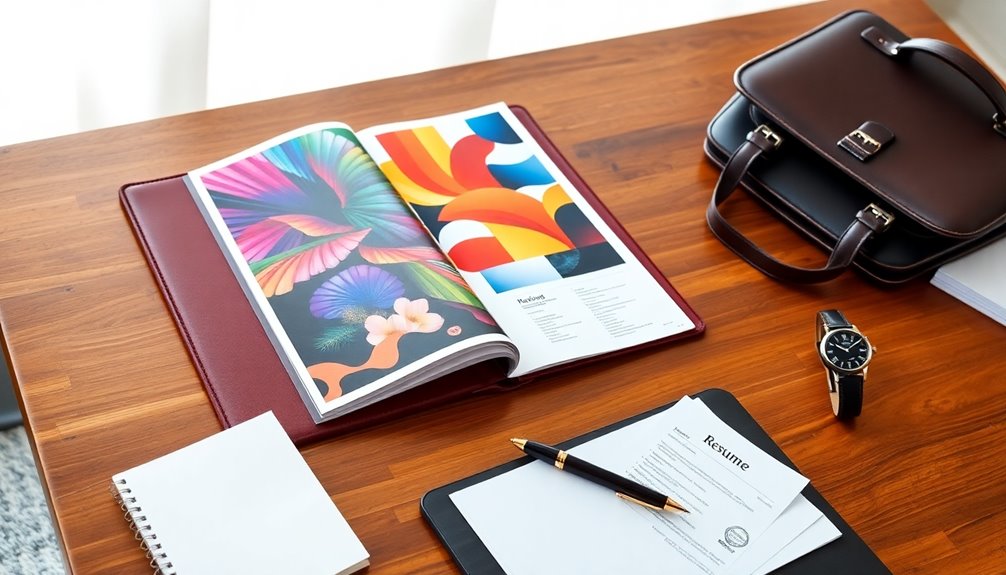
A strong portfolio or work samples can make a significant difference in your job search, especially in creative fields like design, writing, or marketing. These tools are essential for showcasing your skills and relevant experience to potential employers. Including a variety of work samples helps illustrate your capabilities and achievements, providing tangible evidence of your expertise.
To make a positive impression, tailor your portfolio to align with the specific job requirements. Organize it neatly for easy access during the interview, demonstrating your attention to detail and professionalism. Practicing how to discuss your portfolio pieces confidently allows you to effectively highlight your strengths and engage interviewers in meaningful conversations. Additionally, maintaining topical authority in your field can further enhance your credibility during the interview process.
Here's a helpful table to visualize your portfolio preparation:
| Portfolio Component | Purpose | Tips |
|---|---|---|
| Case Studies | Showcase problem-solving skills | Include results and metrics |
| Design Samples | Display creativity | Use high-quality visuals |
| Writing Samples | Highlight writing ability | Choose relevant topics |
| Testimonials | Provide social proof | Include quotes from clients |
Importance of References
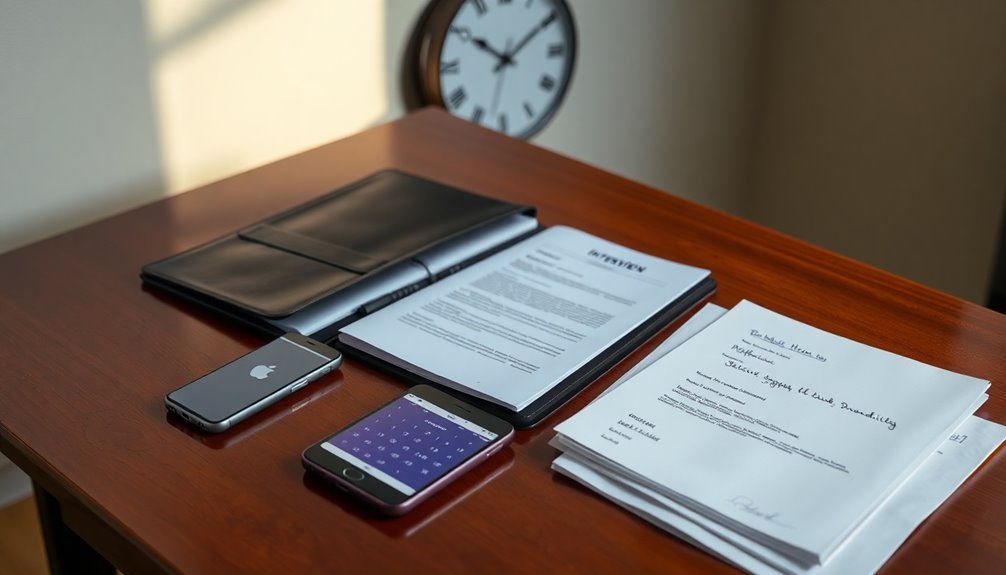
References play an essential role in the job search process, acting as a bridge between your application and the hiring decision. When you provide a strong reference list, you enhance your credibility and showcase your professionalism. Prepared references can expedite the hiring process by giving quick access to additional information about your qualifications and work ethic.
To make a powerful impact, consider including the following in your reference list:
- Names: Clearly state the names of your references.
- Contact information: Make certain you have up-to-date phone numbers and email addresses.
- Qualifications: Briefly highlight each reference's professional background.
- Relationship to you: Describe how each reference knows you, establishing context for the interviewer.
It's important that your references are aware of their role and are willing to be contacted. This can greatly influence hiring decisions, as employers often rely on these insights to validate your experiences. Having references ready not only reflects your professionalism but also reinforces the qualifications you discussed during the interview. So, don't overlook this fundamental aspect of your job search!
Note-taking Tools
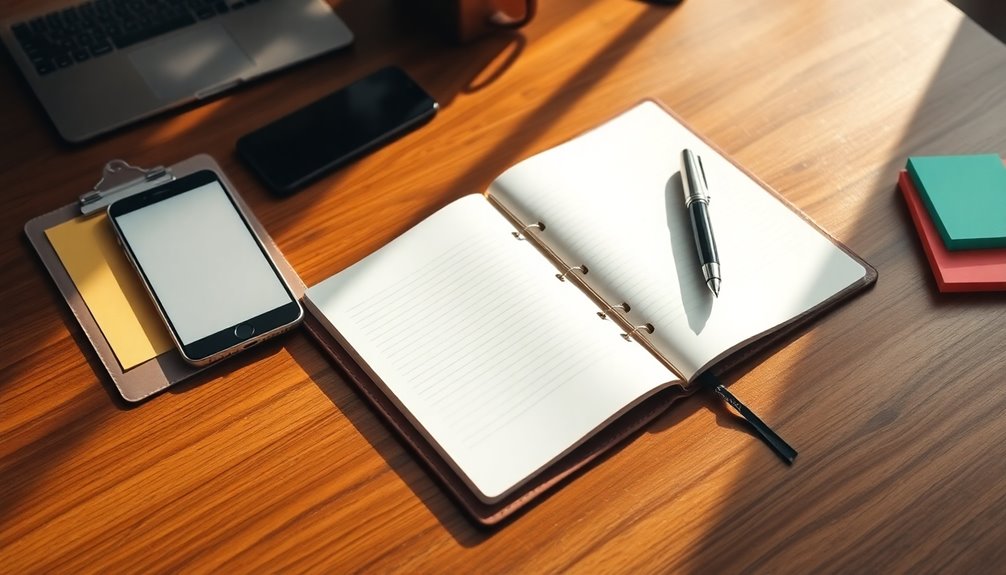
After ensuring you have strong references ready, it's time to think about how you can effectively engage during the interview. One essential tool you shouldn't overlook is your note-taking setup. Bringing a pen and paper shows the interviewer that you're actively listening and interested in what they're saying. It also allows you to take notes on important items to bring up later, demonstrating your professionalism.
Before you start jotting down notes, it's a good idea to ask the interviewer if they're comfortable with you taking notes. This shows respect for their preferences and helps create a positive atmosphere. Additionally, your ability to show strong communication skills will enhance clarity and foster rapport during the conversation.
Here's a quick overview of your note-taking essentials:
| Item | Purpose | Benefits |
|---|---|---|
| Pen and Paper | To take notes during the interview | Signals engagement and active listening |
| Multiple Writing Utensils | Prepared for any situation | Prevents interruptions from malfunctioning pens |
| Notebook | Organized space for your notes | Easy to reference during follow-ups |
Preparing Thoughtful Questions

While preparing for your interview, crafting thoughtful questions can greatly enhance your engagement with the interviewer. Bringing insightful inquiries demonstrates genuine interest in the role and the company, which can positively influence their perception of you as a candidate. Tailor your questions based on your research about the company's values, recent achievements, and team dynamics. This not only showcases your preparedness but also fosters a meaningful dialogue.
Here are some ideas to contemplate when you ask questions:
- Inquire about growth opportunities within the organization to assess alignment with your career aspirations.
- Ask about the team dynamics and collaboration style to understand how you might fit in.
- Explore the company culture to see if it aligns with your personal values.
- Discuss recent projects or achievements to gauge the company's direction and priorities.
- Consider asking how the organization supports employee well-being through programs or resources, as this can indicate their commitment to a positive work environment.
Preparing for the interview with a mix of these thoughtful questions not only addresses your concerns but also makes the interview feel like a mutual evaluation rather than a one-sided interrogation. Engaging in this way helps build rapport with the interviewer, showing you're not just a job seeker but a candidate who's genuinely invested.
Maintaining a Positive Attitude
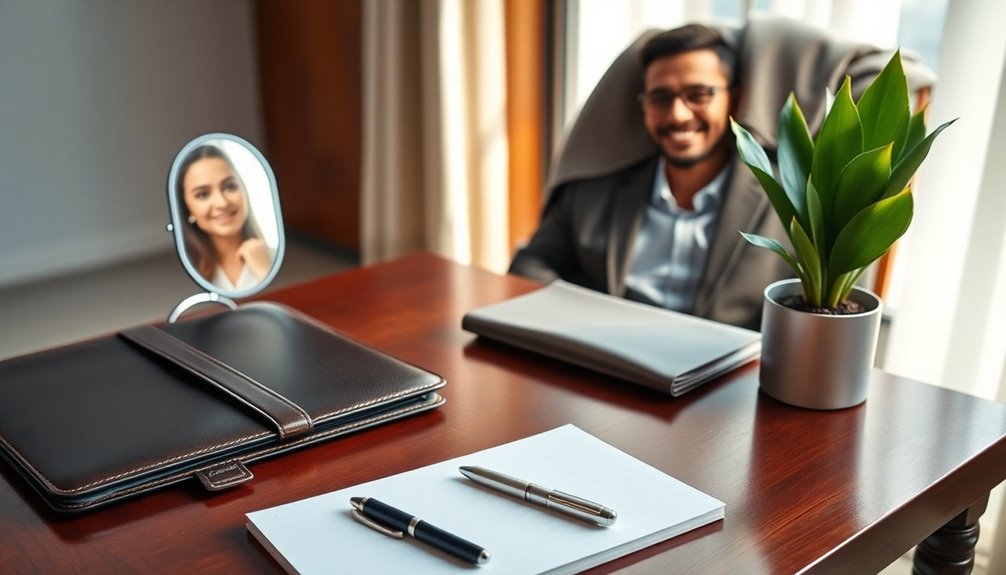
Maintaining a positive attitude during your interview is essential for making a great impression. Smiling, using open body language, and managing nervousness can all contribute to a confident demeanor. Visualizing successful outcomes before the interview can help set the tone for a productive conversation.
Smiling and Body Language
A genuine smile can set the stage for a successful job interview, instantly conveying your enthusiasm and confidence. When you smile, you not only create a friendly atmosphere but also improve your chances of making a favorable first impression. Positive body language is equally vital; it signals your engagement and interest in the conversation, fostering a connection with the interviewer.
To enhance your communication, consider these key elements:
- Maintain eye contact: This shows you're paying attention and are genuinely interested in the discussion.
- Adopt an open posture: Keeping your arms uncrossed and leaning slightly forward demonstrates your willingness to engage.
- Exude a relaxed demeanor: This helps ease tension, making the dialogue more comfortable for both you and the interviewer.
- Use appropriate gestures: They can emphasize your points and reflect your confidence and passion for the opportunity.
Incorporating these techniques into your interview can greatly influence how the interviewer perceives you. Remember, your non-verbal cues, like smiling and nodding, play an essential role in showcasing your likability and professionalism. Additionally, cultivating emotional intelligence can further enhance your ability to connect and communicate effectively during the interview process.
Managing Nervousness Effectively
Nervousness can creep in before a job interview, but you can effectively manage it by adopting a positive attitude. A friendly demeanor not only conveys confidence but also diminishes interview anxiety. Smiling can enhance your likability, creating a welcoming atmosphere.
Here are some strategies to maintain that positive mindset:
| Technique | Description |
|---|---|
| Self-Talk | Engage in positive self-talk to counter negative thoughts. Remind yourself of your qualifications. |
| Relaxation Techniques | Practice deep breathing exercises to calm your nerves before the interview. This helps improve focus. |
| Visualization | Picture yourself succeeding in the interview. This mental imagery boosts your confidence considerably. |
| Preparation | Thoroughly prepare for the interview to reinforce your confidence. Know your resume and company background well. |
Additionally, remember that cultivating a growth mindset can help you view the interview as an opportunity for growth rather than a daunting challenge.
Visualizing Successful Outcomes
Visualizing successful outcomes can be a game changer when preparing for a job interview. By picturing yourself acing the interview, you boost your confidence and reduce anxiety. A positive attitude not only helps you perform better but also influences how the interviewer perceives you. Remember, the interviewer might ask questions to gauge your fit, so it's essential to approach the conversation with enthusiasm.
Here are some strategies to maintain that positive mindset:
- Practice relaxation techniques: Deep breathing or mindfulness can help calm nerves.
- Visualize your success: Imagine yourself confidently answering questions and engaging with a smile.
- Recall past achievements: Remind yourself of times you've succeeded to build your self-esteem.
- Engage with positive body language: A smile goes a long way in creating a friendly atmosphere.
Frequently Asked Questions
Which Should You Always Bring With You to a Job Interview?
You should always bring multiple copies of your resume to a job interview, so everyone can access your qualifications. A professional folder helps keep your documents organized and presents a polished image. Don't forget a valid government-issued ID for building access, and a pen and notepad for taking notes. Finally, prepare thoughtful questions to show your genuine interest in the role and the company culture. This will leave a positive impression on your interviewer.
What Do Interviewers Find Most Unforgivable?
Imagine stepping into an interview, heart racing, and suddenly realizing you've committed a major faux pas. Interviewers find lateness unforgivable; it screams unprofessionalism. They also can't overlook poor body language—slouching or avoiding eye contact can signal a lack of confidence. And if you can't clearly articulate your qualifications, doubts about your fit for the role will linger. Don't let these mistakes overshadow your potential; prepare well and make a strong impression.
What Are 5 Things Employers Can T Ask About in an Interview?
In an interview, there are five key topics employers can't ask about. They can't inquire about your age, marital status, or family plans, as these can lead to discrimination. Questions about your religious beliefs or medical history are off-limits unless directly relevant to the job. Ultimately, they shouldn't ask about your sexual orientation or gender identity. These boundaries help guarantee a fair hiring process, allowing you to focus on your qualifications instead.
What Will I Need to Bring to an Interview?
When you step into an interview, think of a well-prepared canvas versus a blank one. You'll need multiple copies of your resume, a professional folder to keep everything neat, and a valid ID for security clearance. Bring thoughtful questions to reflect your interest, and don't forget writing materials to jot down notes. Each item you carry enhances your confidence and shows you're ready to engage in meaningful conversation.
Conclusion
In a job interview, think of yourself as a chef preparing a meal. Just as a chef gathers fresh ingredients and tools for a perfect dish, you need to collect your essentials for success. By bringing a well-organized folder, multiple resumes, and thoughtful questions, you create a recipe for a standout interview. Remember, the right preparation not only showcases your skills but also leaves a lasting impression, much like a delicious meal that keeps guests coming back for more.

